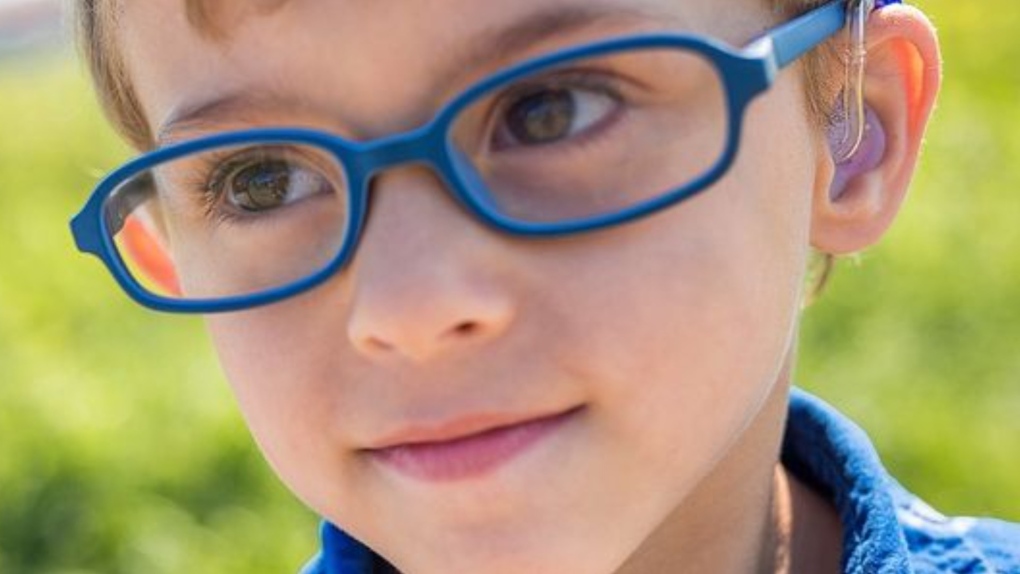1st-in-Canada program launching at UBC to support education, employment of deaf and hard of hearing people
 A young child who requires hearing aids is pictured in a handout photo from the University of British Columbia, which is launching a first-in-Canada program aimed at supporting people with hearing loss.
A young child who requires hearing aids is pictured in a handout photo from the University of British Columbia, which is launching a first-in-Canada program aimed at supporting people with hearing loss.
In a Canadian first, the University of British Columbia has adapted its early childhood education program to support young people who are deaf and hard of hearing (DHH).
The goal of the BC ECE Basic Certificate program is two-fold, according to a release UBC sent out Thursday—to support children with hearing disabilities, as well as adults who are DHH and struggling to find employment.
“The early years are a crucial period for language, learning and social development, yet a shortage of early childhood educators with the expertise to support these children means many do not receive care tailored to their learning needs,” the UBC statement reads.
“The ripple effects of early language deprivation can stretch into adulthood,” it continues.
Data by the Canadian Hard of Hearing Association shows the unemployment rate of people with hearing loss is 32 per cent higher than their fully-hearing counterpart.
Out of that total, only about one in five work full-time, according to CHHA, and 42 per cent are underemployed.
That’s why UBC says its new program will give priority to applicants who experience hearing loss, have a connection to the DHH community or have worked with young children with these specific needs before.
Applications for the September program are open from now until July 3.
After completing the two-year, part-time, hybrid program, graduates will be certified to work as early childhood educators anywhere in B.C.
Lisa Meneian, an educator with experience in early intervention with DHH children, co-developed the course and will be providing weekly support and mentorship to the program’s small cohort.
“Society in general benefits when we have Deaf and hard-of-hearing professionals in the workplace. It strengthens programs. And when we have Deaf and hard-of-hearing children in programs, it strengthens early-learning communities,” Meneian said in the UBC release.
She also highlighted the importance of adult role models for children who experience hearing loss.
Monika Lane, a Parksville mother who has two children who are deaf, as she herself is, says her eldest daughter has suffered due to the lack of specialized educational resources.
“We tried to get an early childhood educator who could work with her but there were none available,” Lane told UBC.
With no other options available, Lane’s daughter was put in a daycare where she was unable to communicate or interact with her peers or staff for a full year. Finally, the daycare received funding to hire an American Sign Language interpreter.
“My children – and other Deaf or hard-of-hearing children in this province – deserve to have early childhood educators who can fully support their language, learning and development needs,” said Lane.
The new program was developed in part thanks to a provincial fund as well as a grant from UBC’s education faculty and support from the school’s accessibility centre.
CTVNews.ca Top Stories

Canadian gov't proposes new foreign influence registry as part of wide-spanning new bill
Prime Minister Justin Trudeau's government is proposing a suite of new measures and law changes aimed at countering foreign interference in Canada, amid extensive scrutiny over past meddling attempts and an ever-evolving threat landscape.
Boeing Starliner capsule's first crewed test flight postponed
The long-awaited first crewed test flight of Boeing's new Starliner space capsule was called off for at least 24 hours over a technical issue that launch teams were unable to resolve in time for the planned Monday night lift-off.
Teacher charged in historical sexual assault of Calgary teenage girl
Calgary police have charged a teacher with the alleged sexual assault of a teenage girl more than 20 years ago.
Winnipeg man admits to killing four women, argues he's not criminally responsible
Defence lawyers of Jeremy Skibicki have admitted in court the accused killed four Indigenous women, but argues he is not criminally responsible for the deaths by way of mental disorder – this latest development has triggered a judge-alone trial rather than a jury trial.
Man banned from owning animals after fatal Calgary dog attack
The owner of three Calgary dogs that got loose and mauled a woman to death in 2022 has been ordered to pay a $15,000 fine within one year and banned from owning any animal for 15 years.
East-end Ottawa family dealing with massive rat infestation
Residents in Ottawa’s Elmridge Gardens complex are dealing with a rat infestation that just won’t go away. Now, after doing everything they can to try to fix the issue, they are pleading with the city to step in and help.
Mediterranean staple may lower your risk of death from dementia, study finds
A daily spoonful of olive oil could lower your risk of dying from dementia, according to a new study by Harvard scientists.
An El Nino-less summer is coming. Here's what that could mean for Canada
As Canadians brace themselves for summer temperatures, forecasters say a weakening El Nino cycle doesn’t mean relief from the heat.
Newfoundland and Labrador latest province to tighten rules on Airbnbs
Newfoundland and Labrador is the latest jurisdiction to bring in stricter rules for short-term rentals, with a coming set of regulations that will force operators to register with the provincial government.

































